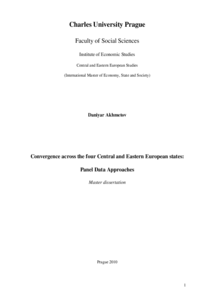Convergence across the four Central and Eastern European states: Panel Data Approaches
diploma thesis (DEFENDED)

View/
Permanent link
http://hdl.handle.net/20.500.11956/24425Identifiers
Study Information System: 149546
Collections
- Kvalifikační práce [18431]
Author
Advisor
Referee
Cahlík, Tomáš
Faculty / Institute
Faculty of Social Sciences
Discipline
Central and Eastern European Studies
Department
Department of Russian and East European Studies
Date of defense
23. 6. 2010
Publisher
Univerzita Karlova, Fakulta sociálních vědLanguage
English
Grade
Good
Keywords (Czech)
Beta-konvergence, determinanty konvergence, tranziceKeywords (English)
Beta-convergence, determinants of convergence, transitionThe aim of the work is to analyze the convergence in the Czech Republic for the period of 1996- 2006. The paper is based primarily on the Barro and Sala-i-Martin's theories of convergence of sub-national territorial units. The regression results proved assumptions to be realistic. The main model concentrates on a panel data approach that captures the extent to which new transport infrastructure influences within-nation regional convergence. This paper developed a regional approach to evaluate the impact of transport infrastructure, human capital and migration in four Central and Eastern European countries - the Czech Republic, Hungary, Poland and the Slovak Republic. The aim is to present an overview of the convergence process of the Czech regions between 1996 and 2006. A neoclassical growth model is used as a framework to study convergence across the 14 administrative units of the Czech Republic. Data on gross value added per capita are exploited. 1
